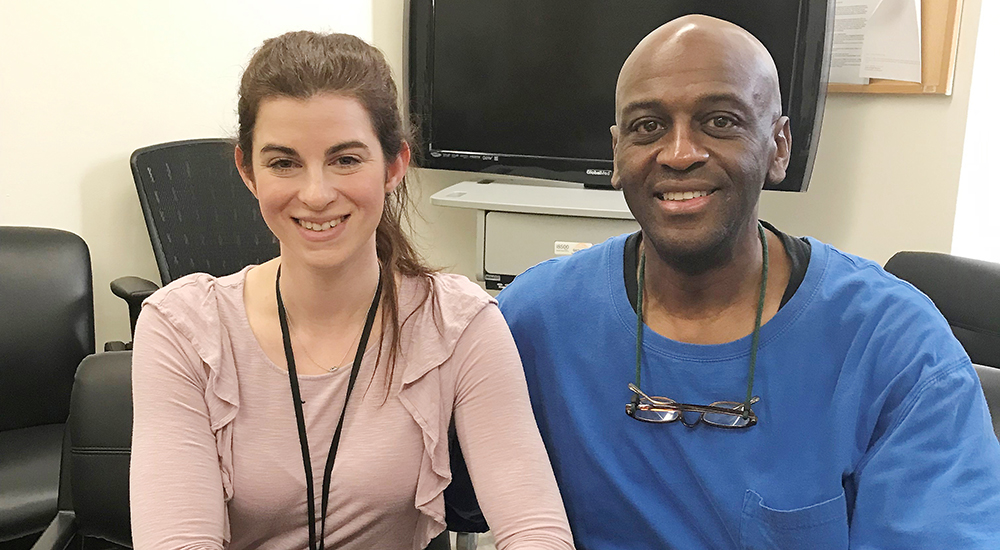Explaining why he decided to lose weight, Marine Corps Veteran Marvin Williams says, “Fear is a great motivator.” Now weighing 250 pounds, he’s lost 100 pounds and his blood pressure medication has been cut in half.
Mourning his younger brother’s death in 2016 from a heart attack, he and a younger brother decided they had to do something to lose weight in a systematic way and generally get healthier. Williams then weighed just over 350lbs. He had a family history of heart disease including his mother’s death from COPD.
“He has done a tremendous job of increasing his physical activity.”
Williams knew he needed to join a program, needed the discipline of weighing in and having a coach, keeping a record of what and how much he eats and how much time he spends exercising. Retired in 2014 after 25 years in security at the Hall of Science in Queens, Williams dedicated himself to restoring his fitness and health.
Registered Dietitian Michelle Hyman (pictured above with Williams) first met Williams about three years ago. He started in the Diabetes Prevention Program at the St. Albans campus and after completing that program, joined the MOVE! weight loss support class.
Hyman lists some of the things she’s recommended to him along the way:
- Reducing frequency and portion size of desserts – encouraged fresh fruit as an alternative
- Replacing less healthy foods with healthier alternatives- for example, whole grain crackers instead of potato chips, roasted or grilled chicken instead of fried
- Increasing daily intake of low carbohydrate vegetables (salads, green beans, broccoli) to help keep him full
- Choosing unsweetened beverages and water instead of sugary drinks
- Making healthier choices at fast-food and take-out restaurants
- Gradually increasing the amount of exercise as he got stronger
- Keeping a food and physical activity record to track his progress and keep him accountable
- Checking his weight on a consistent basis to track progress

Marine Corps Veteran Marvin Williams at 350 pounds BEFORE he joined the MOVE! weight loss support class.
Hyman says she is impressed that Williams has been able to lose a significant amount of weight while still eating fast-food and take-out, which he enjoys. “We discussed how to modify his orders so that they are healthier. He is now very aware of his calorie and fat intake.”
Initially, he was ordering fried chicken salads with high-calorie dressings. Now he orders a grilled chicken salad, to which he adds a can of chickpeas or vegetables (draining out the liquid to reduce the sodium content).
Hyman says, “He has done an excellent job of increasing the amount of fiber in his diet, mostly by incorporating fresh fruit, a lot of vegetables and beans into his diet. He also has done a tremendous job of increasing his physical activity over the past few years, as he’s gotten stronger and healthier. He is very committed to this. He has a piece of cardio equipment he uses at home.”
Williams is a big advocate of the Cross-Country Ski Machine. He uses it so much he’s become expert at repairing the equipment when necessary and he keeps spare parts like rollers on hand. He sets goals of exercising two or more hours a day.
Williams says his clothes are starting to hang off him and he knows getting them tailored is in the future. And he’s very pleased his younger brother’s son has bought into healthy living along with him.
“He’s turning into a bodybuilder,” said proud Uncle Williams.
Topics in this story
More Stories
The Medical Foster Home program offers Veterans an alternative to nursing homes.
Watch the Under Secretary for Health and a panel of experts discuss VA Health Connect tele-emergency care.
The 2024 National Veteran Suicide Prevention Annual Report provides the foundation for VA’s suicide prevention programs and initiatives.







He has done a great job. Losing weight is difficult and requires a lot of hard work and determination.